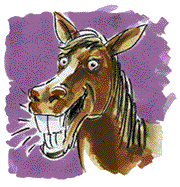|
wear down when the upper and lower teeth grind one another
while chewing the feed.
 While the teeth grind the food, they also trap a fair amount
in between one another which is a major cause of the
inflammation of the gums known as gingivitis. Left
untreated, this condition leads to tooth decay and gum
disease. Another medical condition that may give rise to
problematic teeth is found in horses that are born with an
elongated upper jaw which prevents a proper alignment with
the lower jaw. Such improper alignment will prevent the
horse from being able to adequately wear down its teeth and
this in turn will lead to severe dental problems. Consider
the fact that suddenly the upper teeth do not have corresponding lower teeth to grind them and keep their
growth in check, and you will quite easily ascertain that
the most common problem are unevenly worn teeth that will
impact the animalís ability to properly chew its feed and
thus draw adequate nutrition from its food. Teeth that are
not worn down properly will form pointed surfaces that will
cut into the gums of the opposing jaw that leading to
abscessed gums. While the teeth grind the food, they also trap a fair amount
in between one another which is a major cause of the
inflammation of the gums known as gingivitis. Left
untreated, this condition leads to tooth decay and gum
disease. Another medical condition that may give rise to
problematic teeth is found in horses that are born with an
elongated upper jaw which prevents a proper alignment with
the lower jaw. Such improper alignment will prevent the
horse from being able to adequately wear down its teeth and
this in turn will lead to severe dental problems. Consider
the fact that suddenly the upper teeth do not have corresponding lower teeth to grind them and keep their
growth in check, and you will quite easily ascertain that
the most common problem are unevenly worn teeth that will
impact the animalís ability to properly chew its feed and
thus draw adequate nutrition from its food. Teeth that are
not worn down properly will form pointed surfaces that will
cut into the gums of the opposing jaw that leading to
abscessed gums.
Such condition may be indicated if your horse suddenly
begins tossing its head or appears to evidence behavior that
is in keeping with poor training. Take a look at your
horseís teeth from the side and see if the rate of wear
appears to have formed a wave-like pattern. Other causes for
dental concern are injuries that may lead to the loss of a
tooth, thereby once again disrupting the proper grinding
pattern of the upper and lower teeth. While old horses are
most susceptible to dental problems, horses as young as
foals may evidence them as well.
As you can see, adequate dental care is a priority that must
not be overlooked. Frequent veterinary checks for pointed or
misaligned teeth will prevent abscesses that require costly
treatments. Pointed teeth may be filed down to prevent
injury to the gums. In extreme cases, tooth extractions and
even surgery to promote the proper alignment of the jaws may
be indicated. Ask your veterinarian to train you in the
appropriate methodology of examining the condition of your
horseís teeth yourself so that you can keep a close eye on
its oral health.

|